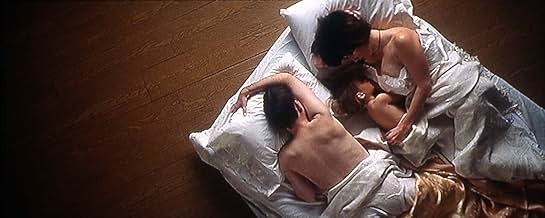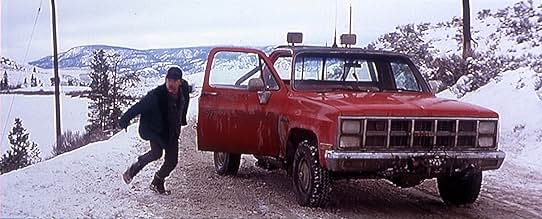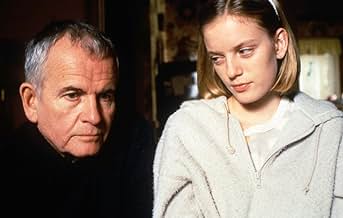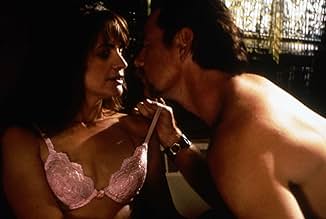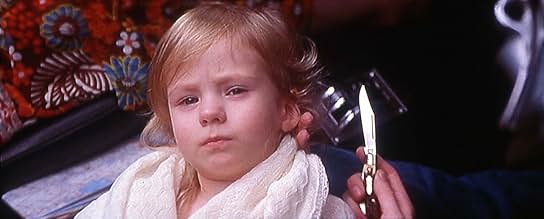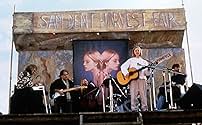A bus crash in a small town brings a lawyer to defend the families, but he discovers everything isn't what it seems.A bus crash in a small town brings a lawyer to defend the families, but he discovers everything isn't what it seems.A bus crash in a small town brings a lawyer to defend the families, but he discovers everything isn't what it seems.
- Nominated for 2 Oscars
- 34 wins & 56 nominations total
- Director
- Writers
- All cast & crew
- Production, box office & more at IMDbPro
Featured reviews
When it comes to drama, The Sweet Hereafter represents the finest cinema of the decade. The film lifts the director Atom Egoyan to the highest place of Canadian directors -right next to David Cronenberg. With extraordinary intelligence, Egoyan -the maker of "Exotica"- creates labyrinths of relationships. Brilliantly using flashbacks the director reveals the emotions of the characters to the viewers -a powerful way to make the audience feel anxiety.
The Sweet Hereafter is based on a novel by Russell Banks. This doesn't mean that Egoyan hasn't created a film that looks like his own creation. Very beautifully, even with a sense of poetry, the camera moves in a canadian small-town, a scenery full of snow. The nicely unusual music of Mychael Danna creates the mood when a lawyer played by Ian Holm arrives to the town. A School bus lies under ice, and the lawyer is invited to sue someone for the loss of several children.
A very important slice of the scenario belongs to a school girl (Sarah Polley), who realizes that the grief of loss can't be eased by judging the cause of it. Also the other people of the town play a remarkable role in the script.
Egoyan speaks clearly, but with a sound of personality, about the need of love, the pain of loneliness and the crossing of emotional obstacles. Fortunately someone knows how to direct interesting movies with elements of drama in them. The Sweet Hereafter possesses a brilliant structure where the visual telling breaths in the spirit of symbolism. I'm a very demanding viewer, a true cynic who always tries to find the worst sides of the film, but in this case I can't say anything negative.
The Sweet Hereafter is based on a novel by Russell Banks. This doesn't mean that Egoyan hasn't created a film that looks like his own creation. Very beautifully, even with a sense of poetry, the camera moves in a canadian small-town, a scenery full of snow. The nicely unusual music of Mychael Danna creates the mood when a lawyer played by Ian Holm arrives to the town. A School bus lies under ice, and the lawyer is invited to sue someone for the loss of several children.
A very important slice of the scenario belongs to a school girl (Sarah Polley), who realizes that the grief of loss can't be eased by judging the cause of it. Also the other people of the town play a remarkable role in the script.
Egoyan speaks clearly, but with a sound of personality, about the need of love, the pain of loneliness and the crossing of emotional obstacles. Fortunately someone knows how to direct interesting movies with elements of drama in them. The Sweet Hereafter possesses a brilliant structure where the visual telling breaths in the spirit of symbolism. I'm a very demanding viewer, a true cynic who always tries to find the worst sides of the film, but in this case I can't say anything negative.
I re-watched The Sweet Hereafter on video last night, and am still haunted by it today. It is structured so that you know some of the basic tragic plot near the beginning. This caused my eyes to water at some of the beautiful lyrical overhead tracking shots of the school bus winding through the snow covered roads of the Pacific northwest.
The film switches between the time that the lawyer arrives in town to "help" the families receive compensation, and to days just prior to the accident. We witness a loving "hippie" couple who has adopted a beautiful Native American boy, a loving mother of a school phobic learning disabled boy, and a widower who loves his two children a great deal and sees them off to school by following them in his truck. This same widower is having an affair with the mother of the school phobic--she is unhappily married to a "pig" of a husband. Complicating matters is the father who obviously loves his teenage daughter in Lolita-like fashion.
Part of the theme of The Sweet Hereafter is similar to Magnolia--accidents do happen--perhaps no one at fault... or perhaps all the adults had some part in it without anyone being at fault, as only the innocent children were killed.
The town had changed... tragedy has taken away the town's joy and innocence. The parents are no longer open with each other, but guarded, suspicious... in deep grief.
The lawyer is little more than an ambulance chaser, attempting to profit off their tragedy. Yet, he, too is a tragic figure who has already "lost" his daughter--
He had saved her when she was a baby, yet she has now turned away from him... and his feelings are now ambivalent towards her--he is a grief-stricken, defeated father, who vascillates between wanting to talk with his daughter on his cell phone and deciding to cut her off.
The story of the Pied Piper is interweaved between various events in the movie to give greater depth to the story. There's also a great scene in the movie between the lawyer and the garage mechanic, who has lost his two children, that shows that the theme is much broader than the literal story:
"I'm telling you this because... we've all lost our children, Mr. Ansel. They're dead to us. They kill each other in the streets. They wander comatose in shopping malls. They're paralyzed in front of televisions. Something terrible has happened that's taken our children away. It's too late. They're gone."
This movie isn't for everyone. It's a serious, layered piece with a lot of melancholy. The kind of fare that film critics can love, but Academy voters will avoid. But what it strives to accomplish is done very well. And it will stay with you long after the final scenes have appeared.
The film switches between the time that the lawyer arrives in town to "help" the families receive compensation, and to days just prior to the accident. We witness a loving "hippie" couple who has adopted a beautiful Native American boy, a loving mother of a school phobic learning disabled boy, and a widower who loves his two children a great deal and sees them off to school by following them in his truck. This same widower is having an affair with the mother of the school phobic--she is unhappily married to a "pig" of a husband. Complicating matters is the father who obviously loves his teenage daughter in Lolita-like fashion.
Part of the theme of The Sweet Hereafter is similar to Magnolia--accidents do happen--perhaps no one at fault... or perhaps all the adults had some part in it without anyone being at fault, as only the innocent children were killed.
The town had changed... tragedy has taken away the town's joy and innocence. The parents are no longer open with each other, but guarded, suspicious... in deep grief.
The lawyer is little more than an ambulance chaser, attempting to profit off their tragedy. Yet, he, too is a tragic figure who has already "lost" his daughter--
He had saved her when she was a baby, yet she has now turned away from him... and his feelings are now ambivalent towards her--he is a grief-stricken, defeated father, who vascillates between wanting to talk with his daughter on his cell phone and deciding to cut her off.
The story of the Pied Piper is interweaved between various events in the movie to give greater depth to the story. There's also a great scene in the movie between the lawyer and the garage mechanic, who has lost his two children, that shows that the theme is much broader than the literal story:
"I'm telling you this because... we've all lost our children, Mr. Ansel. They're dead to us. They kill each other in the streets. They wander comatose in shopping malls. They're paralyzed in front of televisions. Something terrible has happened that's taken our children away. It's too late. They're gone."
This movie isn't for everyone. It's a serious, layered piece with a lot of melancholy. The kind of fare that film critics can love, but Academy voters will avoid. But what it strives to accomplish is done very well. And it will stay with you long after the final scenes have appeared.
This was one of the saddest films I have ever seen. I do not mean that in bad way though. I have seen sad films that made me depressed and I usually disliked them because of this. The Sweet Hereafter is different though. It is a sad film without being manipulative and fake. The film brilliantly shows how people need to have revenge. After a bus accident where all but two are killed the people of the town, after a lawyer pushes them on, become obsessed with suing those responsible. Egoyan looks at how people can not accept that things happen by accident. The people of the town feel that someone has to pay for the pain they are feeling and in the end they are the ones to pay for it. The acting is excellent, especially Ian Holm. Once you become accustomed to the time shifts this is an incredibly rewarding film that you will always remember.
Mitchell Stephens (Ian Holm) is a lawyer struggling with his drug addicted daughter. He's trying to convince various parents to sue the town. They lost their children when the school bus driven by Dolores Driscoll (Gabrielle Rose) gets into an accident on a snow covered road. The town is the only one with deep pockets and Mitchell will say anything to get them to sue. Nicole Burnell (Sarah Polley) is a survivor who was sexually corrupted by her father.
This movie meanders a lot. There are long flashbacks of not only the bus ride and crash but also some of the life before that day. It has an ethereal dreamlike quality about it. It has the sad moody devastation. It doesn't make it a compelling watch unless seeing the saddest people in the world is fun for you.
This movie meanders a lot. There are long flashbacks of not only the bus ride and crash but also some of the life before that day. It has an ethereal dreamlike quality about it. It has the sad moody devastation. It doesn't make it a compelling watch unless seeing the saddest people in the world is fun for you.
I've seen this film twice now, and had the same reaction both times, so it's not out of gut reaction that I label "The Sweet Hereafer" an odious piece of simple-minded garbage.
The central idea (a school bus crash) has such intrinsic emotional repercussions that I can see how most viewers are washed away in grief enough to not notice the emptiness of the conceit built around it.
As an intruding lawyer, Ian Holm is asked to give a performance of staggeringly self-conscious falseness in which his every word, movement and breath is meant to project "SOMETHING IMPORTANT". His episodic encounters with the people of the community in which the accident took place only reveals Egoyan's total condescension toward life's "little people", presenting them as simpletons who, gosh darn it, love their children and each other and turn their noses up at anything so disgusting as a dollar bill.
In a failed attempt to make at least one character two-dimensional, a subplot is slopped on about the lawyer losing touch with his own child, the most ridiculous drug-addicted banshee every put on film.
Toss in heavy-handed allegories, heart-tugging muzak and trite conclusions, and what have you got? An award-winning "masterpiece", to hear most people talk. More likely they woke up the next morning, remembered something about angelic children heading for their final bus ride, and forgot the manipulative banality of the rest.
View the first episode of Krzysztof Kieslowski's 1988 "Decalogue", which covers similar thematic ground and, in 50 short minutes, accomplishes worlds more.
3 out of 10 for nice work by actors Bruce Greenwood and Sarah Polley.
The central idea (a school bus crash) has such intrinsic emotional repercussions that I can see how most viewers are washed away in grief enough to not notice the emptiness of the conceit built around it.
As an intruding lawyer, Ian Holm is asked to give a performance of staggeringly self-conscious falseness in which his every word, movement and breath is meant to project "SOMETHING IMPORTANT". His episodic encounters with the people of the community in which the accident took place only reveals Egoyan's total condescension toward life's "little people", presenting them as simpletons who, gosh darn it, love their children and each other and turn their noses up at anything so disgusting as a dollar bill.
In a failed attempt to make at least one character two-dimensional, a subplot is slopped on about the lawyer losing touch with his own child, the most ridiculous drug-addicted banshee every put on film.
Toss in heavy-handed allegories, heart-tugging muzak and trite conclusions, and what have you got? An award-winning "masterpiece", to hear most people talk. More likely they woke up the next morning, remembered something about angelic children heading for their final bus ride, and forgot the manipulative banality of the rest.
View the first episode of Krzysztof Kieslowski's 1988 "Decalogue", which covers similar thematic ground and, in 50 short minutes, accomplishes worlds more.
3 out of 10 for nice work by actors Bruce Greenwood and Sarah Polley.
Did you know
- TriviaAs indicated on writer and director Atom Egoyan's commentary track on the DVD, many people ask about the odd mask worn by the notetaker during the deposition scene. This is a stenographer's mask, an item which is used in real life by a stenographer to record his or her own voice during the deposition.
- GoofsWhen Stephens visits the Ottos, and Mr. Otto offers him some tea, we hear a tea kettle whistling but the one we see on the wood stove is not the whistling type, and there is no steam coming from the kettle.
- Quotes
Mitchell Stephens: You'd make a good poker player, kid.
- SoundtracksOne More Colour
Words and Music by Jane Siberry
Courtesy of Wing in Music/Red Sky Music
Arranged by Mychael Danna
Vocal by Sarah Polley
Performed by The Sam Dent Band
- How long is The Sweet Hereafter?Powered by Alexa
Details
Box office
- Budget
- CA$5,000,000 (estimated)
- Gross US & Canada
- $3,263,585
- Opening weekend US & Canada
- $31,149
- Oct 12, 1997
- Gross worldwide
- $3,263,585
- Runtime
- 1h 52m(112 min)
- Color
- Sound mix
- Aspect ratio
- 2.35 : 1
Contribute to this page
Suggest an edit or add missing content


